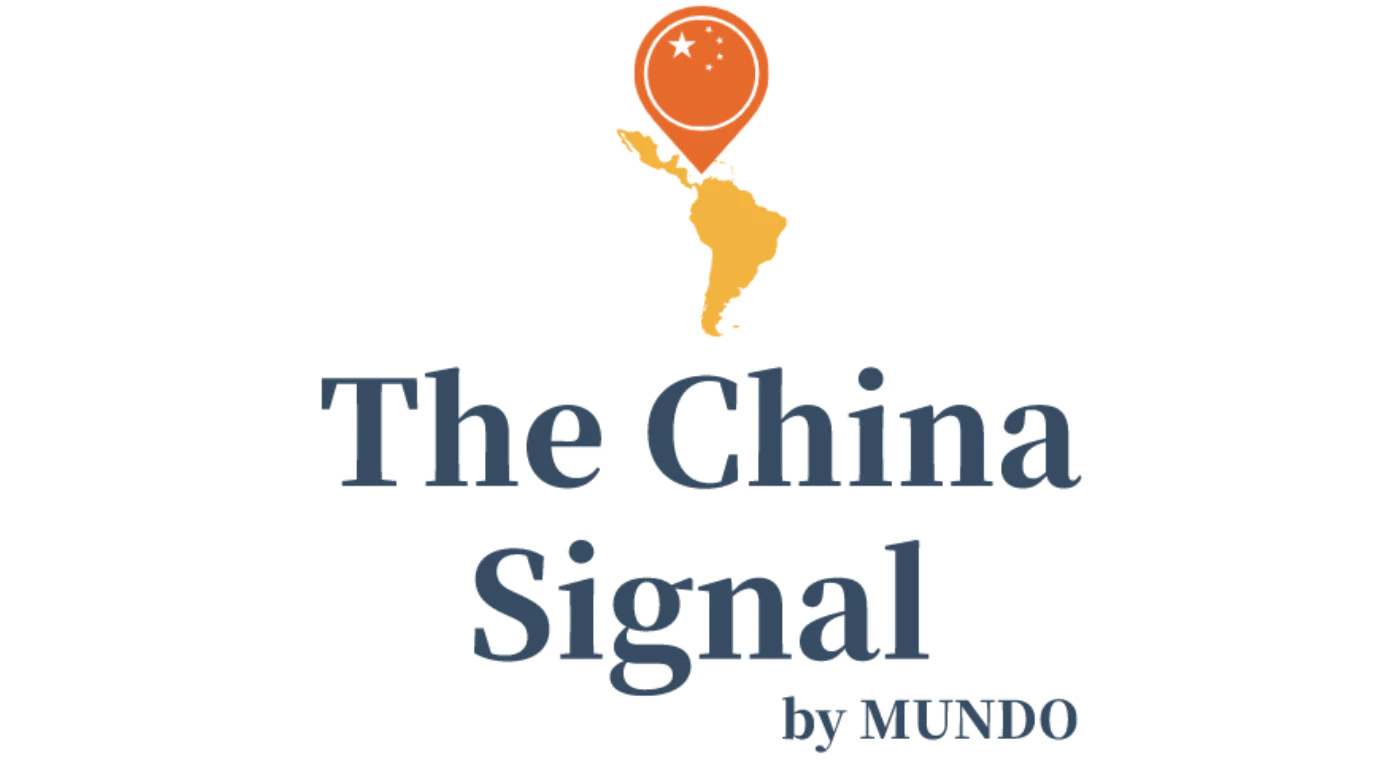G’day, and welcome to The China Signal. Here’s what you need to know:
Telecommunications - Ecuador, Peru. ZTE will lay fiber optic cable in Ecuador and Peru.
Oil - Venezuela. PetroChina wants to resume crude oil imports.
Infrastructure - Costa Rica. The Costa Rican government wants more loans from China ExIm bank to complete overdue highway infrastructure being built by CHEC.
Finance - Suriname. Suriname wants a debt deal with Chinese creditors to repair its credit rating and attract more international oil and gas investment.
Manufacturing - Mexico. Canadian auto makers are protesting the nearshoring moves of Chinese auto suppliers in Mexico.
Minerals - Bolivia. Chinese consortiums will build a zinc refinery in Oruro, supporting the government’s ambition to grow their zinc exports.
Plus more. Read on… but before you do, please welcome the latest addition to our team, Isabel Bernhard. Isabel is a former Assistant Director at the Atlantic Council's Adrienne Arsht Latin America Center. She has international experience across think tanks, nonprofits, governments, and in quantitative social science research on China, Taiwan, and Latin America. You’ll see her work annotated as “IB”.
Telecommunications 🏗️📲
Ecuador 🇪🇨
Chinese state owned telco ZTE will provide Fiber To The Home infrastructure for Claro Ecuador, a subsidiary of America Móvil Latin America. This will be ZTE's first large-scale commercial use of its Light ODN solution beyond China.
ZTE’s presence in Latin America goes beyond Ecuador; on October 30, ZTE also announced its partnership with Bitel Peru, deploying its Light ODN solution across 204 regions within the country.
The United States banned sales and imports of ZTE and Huawei telecommunications devices and equipment in November 2022 for being an “unacceptable risk” to national security. Several EU member states have also banned ZTE from participating in their 5G networks.
Background: ZTE Corporation (“ZTE”) 🔎
Initially founded in Shenzhen in 1985 as Zhongxing Semiconductor Co. Ltd, ZTE is one of the world’s largest telecommunications equipment suppliers. ZTE generates $17 billion in revenue (2022). Foreign sales accountfor over half of total revenues.
ZTE has been accused of abetting mass surveillance. In 2017, ZTE violated economic sanctions by illegally exporting U.S. technology to Iran and North Korea.
In 2018, the Venezuelan government paid ZTE US$70 billion to construct the “fatherland card,” a monitoring system which tracks information about citizen behavior. A year later in Argentina, ZTE won a US$30 billion contract to install surveillance infrastructure in the northern province of Jujuy. (VV)
Oil 🛢️
Venezuela 🇻🇪
Chinese state-owned oil and gas company, PetroChina, wants to resume Venezuelan crude oil imports after a four-year hiatus caused by US sanctions that were eased in October. PetroChina has proposed buying 265,000 barrels per day (b/d) from Venezuelan state-owned oil company PDVSA, with payment in yuan. PDVSA doesn’t have the capacity to immediately meet these levels, following years of underinvestment due to US sanctions and corruption.
Per Reuters:
PetroChina's new proposed deal could temporarily isolate the crude trade between the two oil companies from the wider Caracas-Beijing bilateral agreements on debt repayments, whose linked oil supply contracts are set to expire in 2024, documents seen by Reuters showed.
A delegation from defense firm China Aerospace Science and Industry Corp (CASIC), is in Caracas separately pursuing oil cargoes, one of the people said. State-run CASIC has received Venezuelan oil in recent years as debt service payment.
Despite US sanctions, Venezuela continued direct shipments of oil to China.
Since November 2020, CASIC has transported Venezuelan crude in three tankers it acquired from PetroChina. At Chinese customs entry points, millions of barrels of oil were declared without specifying their origin (see TCS September 9, 2022).
Saw it coming: In September, Maduro and Xi met for the first time in five years.
We suggested this was in anticipation of the US easing sanctions on Venezuela. This visit was seen as a revival of Venezuela and China’s long standing relationship with China, which upgraded the relationship to an “all weather partnership,” a label reserved only for select countries (see TCS September 22). (VV)
Infrastructure 🏗️
Costa Rica 🇨🇷
Costa Rica’s Minister of Public Works and Transportation has requested more funding from China’s Export-Import (“Exim”) Bank to defray over$100 million in project costs for the unfinished Highway 32.
The highway is being built by China Harbor and Engineering Corporation (“CHEC”). The project has suffered several costly delays since its inception in 2018.
China’s Exim Bank was also the original provider of a US$395 million project loan to start construction in 2018.
CHEC was investigated by Bolivian authorities in September 2022, who alleged over $3.5 billion in contracts were unfairly awarded (see TCS September 28, 2022). (IB)
Brazil 🇧🇷
On October 26, Rafael Fonteles, governor of Brazil’s Piauí state, signed three MoUs with Zhao Long, governor of the Fujian province to “improve port operations and foster research.” No further details are available.
The Council on Foreign Relations recently mapped China’s control of overseas ports: find it here. (NRM)
Finance 💸
Suriname 🇸🇷
Suriname hopes to strike a deal with China by mid-December to reschedule interest payments on its debt beyond 2024, said Albert Ramdin, the country’s Foreign Minister, during a visit to China (see TCS June 16 and TCS October 31 for further background). Suriname needs a deal with China, the largest of its bilateral creditors, to improve its credit rating and attract fresh foreign funds for its oil and gas industries. Suriname is also renegotiating its $600 million debt with the IMF.
Suriname owes Chinese creditors around$540 million, according to the Suriname Debt Management Office, of which close to$130 million is in arrears.
China Exim Bank is Suriname’s largest Chinese creditor, with loans to at least six infrastructure projects in the country.
Suriname defaulted on its foreign debt three times during the COVID-19 pandemic. (RP)

Manufacturing 🛠
Mexico 🇲🇽
The president of Canada’s Auto Parts Manufacturers Association expressed concern that China’s growing investment in Mexico’s auto industry could lead to competitive disadvantages for Canadian firms operating in Mexico.
Sales of Chinese-branded cars in Mexico grew 24% in the twelve months to August 2023. Chery Automobile Co., BYD, and Great Wall Motor Co. have all recently begun selling into Mexico.
Awareness of China’s nearshoring to Mexico is growing. Under the rules of USMCA, “automakers can import cars into the US duty free, as long as 75% of each vehicle’s parts were built in North America.” Chinese state-owned enterprises could earn significant profits by investing in Mexican auto manufacturers, avoiding tariffs.
A post-pandemic surge in nearshoring and reshoring, particularly around Monterey, has raised concerns about “fair competition” from rivals to Chinese firms in Mexico. (IB)
Peru 🇵🇪
KEDA Industrial Group, a Chinese state-owned building materials company based out of Foshan, will invest $100 million in a glass plant in Cañete, Peru towards the local sale, export and distribution of granite, marble, ceramics, porcelain, glass and derivatives.
The daily production capacity of the plant will be 600 tons of glass and approximately 197,100 tons yearly.
KEDA Group also operates in Mexico, Colombia, Brazil, Argentina, and Bolivia, and had a total revenue of US$11.15 billion in 2022. (VV)
Business 💼
Peru 🇵🇪
DiDi aims to grow its number of drivers by 30 percent in Peru, investing $10 million by the end of 2023.
DiDi is amongst the most popular ride-sharing apps in Latin America. It has reached 3.5 million Peruvians since entering the country in December 2020. The company has invested over $50 million since, expanding its care service and food delivery businesses.
Elsewhere, the Chinese state-owned transport company is undergoing reorganization: DiDi laid off twenty percent of its global workforce this year. (VV)
Minerals 🪨
Bolivia 🇧🇴
In support of the Bolivian government’s ambition to grow its refined zinc exports, Chinese consortiums Enfi-Crig and Chongqing Cisdi Engineering Consulting Ltd. will build a zinc refining plant in the department of Oruro. Construction, which will occur on the property of the Karachipampa Metallurgical Company, is expected to be complete by 2025.
Bolivia aims to produce sixty-five thousand tons of metallic zinc per year. Bolivia is the world’s ninth largest zinc exporter.
China Eximbank will finance construction with a $350 million loan. According to the Minister of Mining and Metallurgy Marcelino Quispe, the loan is for twenty years with a two-percent concessional interest rate.
For further background on the Oruro zinc refinery project, see TCS March 8 & TCS June 16. (VV)
Trade 📊
Ecuador 🇪🇨
After approval of the Ecuador-China Free Trade Agreement was stalled when an election was triggered in May, Ecuador’s Constitutional Court approved it on November 1.The newly installed National Assembly will then ratify the FTA; it reconvenes on November 20.
The FTA will allow preferential access for 99 percent of exports to China, and expects to increase Ecuador’s exports by$3-4 billion over the next 10 years.
The exporters’ union Cordex is urging the new National Assembly to prioritise passage of the FTA when they convene on November 20. (VV)
Diplomacy 🕊️
Honduras 🇭🇳
Honduras’ and China’s foreign ministers met in Beijing on November 1 to continue negotiating a Free Trade Agreement. Diplomatic relations were established between the two countries in March. As next year’s CELAC presidency holder, Honduras will have increased regional influence over the direction of China-Latin America and Caribbean ties.
Both sides hope to show the supposed benefits of the new relationship. Two agreements were reached lately:
Texhong, a Chinese textile company, will invest US$400 million in Honduras after previously purchasing 200 hectares of land outside San Pedro Sula. The move is expected to create 7,000 jobs.
Sunda International, a Chinese company specializing in cleaning and hygiene products, plans to invest in a diaper and detergent manufacturing plant. The plant is expected to create 3,000 jobs and construction will begin in the second half of 2024. (IB)
Cuba 🇨🇺
Cuba’s Prime Minister Manuel Marrero signed agreements on transportation, biotechnology, agriculture, and digital television during a visit to China from November 2 to 9.
Marrero also visited the Sino-Cuban joint venture Biotech Pharma and the headquarters of China's e-commerce platform JD.com.
This was Marrero’s first visit to China since he took office in December 2019. (RP)
Nicaragua 🇳🇮
Four MoUs covering housing, transportation, energy, and technical training assistance were signed on November 8, following meetings between Nicaraguan officials in China and Chinese government and industry officials. As Nicaragua faces diplomatic marginalisation over its autocratic governance, Beijing is providing legitimacy and resources to Nicaraguan authorities.
The China International Development Cooperation Agency, the China Communications Construction Company, the vaccine manufacturer Sinopharm and the Sinosure export credit insurance enterprise featured prominently on the meeting agendas.
Details of the MoUs aren’t publicly available.
Nicaragua received another fleet of 200 buses from electric bus manufacturer Yutong. This is the second shipment after 250 buses were delivered on October 13 (see TCS October 31). (IB)








